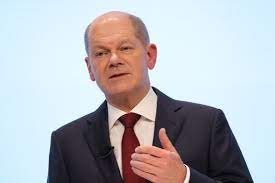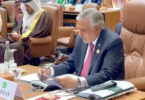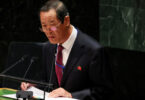BERLIN (Reuters): German Chancellor Olaf Scholz on Wednesday called on the ruling coalition, democratic opposition and local authorities to pull together to overcome the “mildew of red tape, risk averseness and despondency” that has spread across Europe’s largest economy in recent years.
“The citizens are fed up with this standstill, and I am too,” Scholz said in a speech to the Bundestag lower house of parliament during a session on the 2024 budget, sporting a black eye patch following a jogging accident.
The chancellor announced a new “Germany pact” with a bundle of measures aimed at reducing bureaucracy, speeding up approval processes for new construction and digitising citizens’ access to key government services.
The pact sets out a range of goals to be achieved in consultation with powerful regional governments including swifter online consultation processes for wind farms and transport and data networks, a government document showed.
“Citizens want orientation, courageous compromises,” Scholz said. “That is my demand of us all: the government parties that have argued too loudly in recent months and also the democratic opposition.”
This was also key, he said, to fend off “those who want to draw political profit from decline scenarios and panic-mongering” in reference to the far-right party Alternative for Germany (AfD), which has surged in polls over the past year to second place, well ahead of Scholz’s Social Democrats (SPD).
This “so-called alternative” was in reality a “demolition commando” for our country, he said in unusually harsh terms.
The chancellor rejected the idea of fresh stimulus to boost an economy battling high inflation, financing costs and a drop in exports.
“I set no store by a debt-financed flash-in-the-pan so-called stimulus programme that would counteract the European Central Bank’s attempts to fight inflation,” he said.
The government was already investing record sums, he said. The 2024 budget foresaw it investing 58 billion euros from its climate fund in hydrogen, the chip industry, climate-friendly mobility, digital infrastructure and building renovation.
It was also investing 54 billion euros from the regular budget in railways, new bridges, faster internet, charging stations, social housing and a climate neutral economy. Rail operator Deutsche Bahn alone was getting 24 billion euros extra in investment over the coming four years.
Such sums showed Germany was holding its own vis-à-vis the US and the $430 billion US Inflation Reduction Act, he said.







